Infantrymen clear a village, covered by a Bren gunner and a couple of riflemen.
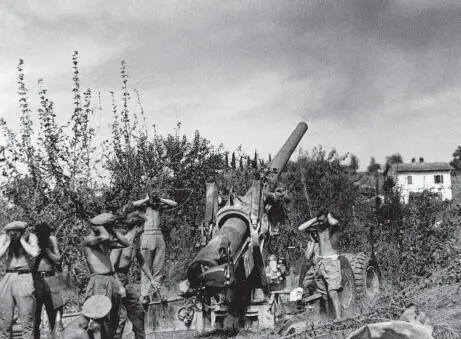
The Royal Artillery’s 155mm gun goes into action.
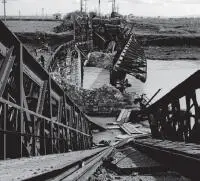
Throughout the length of Italy German engineers delayed our advance by blowing every bridge in our path.
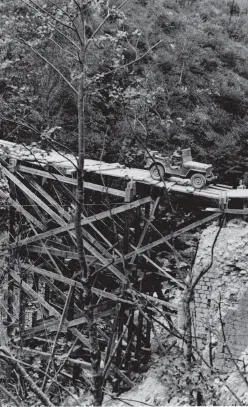
The Royal Engineers’ first solution sometimes looked slightly insecure …
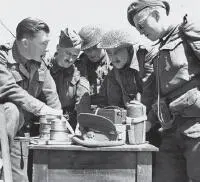
Briefing AFPU cameramen on how we’ll cover the next battle. The regulation De Vry cine-camera, next to water bottle.
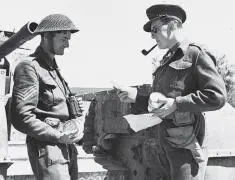
Sergeant Radford had been filming a Regiment of Churchill tanks in action. His film stock is replenished …
… and the footage he has shot is taken by dispatch rider back to the Developing Section at base.
We were issued with Super Ikontas, inadequate cameras without telephoto lenses.
Celebrating our Sicilian victory at Casa Cuseni in Taormina, while awaiting the invasion of Italy. We even had time to perfect the Unit’s ‘Silly Walks’ – some 30 years before Monty Python.
I can’t remember the reason for this outburst of warrior’s relaxation. (It was in the morning, so demon vino was no excuse). Excessive exuberance, perhaps.
The Mess dining room, 60 years ago. Today, unchanged, even the pictures are the same …
… as is the terrace. In those days …
… and now.
I thought we had got away with it until my contraband car was admired at embarrassing length – by King George VI. As I stood to attention before His Majesty, it seemed cruel that the only finger of suspicion should be Regal.
The King had just arrived in Tunis at the start of his Mediterranean tour with Sir James Grigg and Sir Archibald Sinclair. In the welcoming cortège at the airport he spotted my unusual Afrika Korps convertible and pointed it out to General Alexander: ‘That’s a fine car,’ said His Majesty. ‘Very fine.’ The General, compact and elegant, studied it for what seemed a long time. Following his eyeline, all I could see was my phone number growing larger under Royal inspection.
‘Yes Sir,’ he said, finally. ‘A German staff car captured near here by this young officer, I should imagine.’ He gave me a thoughtful look – then they all drove away in a flurry of flags and celebration. I took the phoney car in the opposite direction, quite fast.
It transported me in comfort for some happy weeks until, parked one afternoon outside the office of the Eighth Army News in Tunis it was stolen by – I discovered years later – a brother officer from the Royal Engineers. Stealing captured transport from your own side has to be a war crime.
The King sailed to Malta in the cruiser Aurora , and we scrambled to reach Tripoli by road in time to cover his reception there. The Libyan capital was a cheerless contrast to exuberant Tunis, where they loved us. Streets had to be cleared of sullen Tripolitanians who evidently much preferred Italian occupation. I waited for the arrival ceremony in an open-air café and for the first time heard the wartime anthem ‘Lili Marlene’, played for British officers by a bad-tempered band. It felt strange to be unwelcome – after all, we were liberators.
The immaculate King was greeted by General Montgomery, who as usual dressed down for the occasion: smart casual – shirt, slacks, black Tank Corps beret, long horsehair flywhisk.
Filming with us was our new commanding officer, Major Geoffrey Keating, who became a close friend until his death in 1981. Keating had cut a brave figure in the desert; his photographs and those of his cameramen first made the unusual and unknown Montgomery a national hero. In truth, with high-pitched voice and uneasy birdlike delivery, he was a man with little charm or charisma. He seemed unable to relate to his troops, though on occasion he would try – proffering packets of cigarettes abruptly from his open Humber. However, he was a winner – and because of AFPU was the only publicly recognisable face in the whole Eighth Army.
Montgomery would never start a battle he was not sure of winning, so his men – who had suffered more than their ration of losing Generals – followed him cheerfully. His main military principle was that Army commanders should plan battles – not staff officers and certainly not politicians. Unsurprisingly he was not too popular with his Commander, Winston Churchill, who since Gallipoli and South Africa had longed to control troops in action.
On top of all his achievements, Churchill had a lifetime yearning to become a warrior-hero. He did not hide this improbable dream. An early biographer wrote, ‘He sees himself moving through the smoke of battle, triumphant, terrible, his brow clothed with thunder, his Legions looking to him for victory – and not looking in vain. He thinks of Napoleon; he thinks of his great ancestor the Duke of Marlborough …’
After the Gallipoli disaster in the Great War he did achieve a few months of frontline battle as a Lieutenant Colonel commanding a Rifle battalion in France. Ever afterwards he looked for another commanding role on some dramatic battlefront. At last Anzio emerged – the assault landing no one wanted. We who went there soon understood why.
Keating had flown to London with his victorious General and returned with the news that, as expected, we were about to assault Italy. The Eighth Army, the US Seventh Army and the 1st Canadian Corps would first attack Sicily, that hinge on the door to Europe, and then pursue the enemy north towards the Alps.
Invasion forces for Operation Husky were gathering at Mediterranean ports from Alexandria to Gibraltar, so I left hateful Tripoli with a convoy of new AFPU jeeps just off a ship from the States and headed flat-out across the desert back to Sousse, from where our invasion fleet would sail.
At the Libyan border we slipped off Mussolini’s tarmac road on to the sandy track through Tunisia. This had been deliberately left in poor condition by the French to slow Mussolini’s armoured columns – or that was their excuse. Through Medenine and the Mareth Line the hot desert which had so recently been a desperate battlefield and seen the last hurrah of the Afrika Korps now stood quiet and empty. It was dotted with the hulks of tanks and armoured cars, and the occasional rough wooden cross: a few sad square feet of Britain or America, Italy or Germany.
Sousse was bustling as XIII Corps got ready to fight again. We placed cameramen with the battalions which were to lead the invasion. I was to land with the famous 51st Highland Division which had battled 2,000 miles across North Africa from El Alamein. The Scots are rather useful people to have on your side if you’re expecting to get into a fight, and I was promised a noisy time.
Before the armada sailed I dashed back to Sidi Bou Saïd with secret film we had taken of the invasion preparations for dispatch to London. Coated with sand and exhausted, I arrived at our requisitioned hillside villa to find a scene of enviable tranquillity: on the elegant terrace overlooking the Bay, AFPU’s new Adjutant was giving a dinner party.
Читать дальше

















